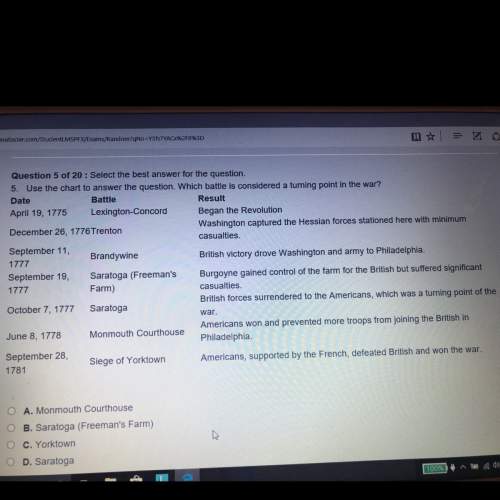
During the Industrial Revolution, most people were "unskilled labor," and there were many workers
available for jobs. Why did this decrease their negotiating power and protection at work?
Workers were not smart enough to stick up for themselves or ask for better working conditions,
Unskilled workers did not deserve protection at work until they learned the skills of the workplace.
Working conditions were not bad, there were always workers willing to take the job.
Everyone was replaceable; it an unskilled worker was fired for asking for fair wages, another worker
was ready to take the job immediately

Answers: 1


Other questions on the subject: History

History, 21.06.2019 22:00, borbin
Which line from extremely loud and incredibly close reveals a melancholy tone? as for the bracelet mom wore to the funeral, what i did was i converted dad’s last voice message into morse code, and i used sky-blue beads for silence, maroon beads for breaks between letters . . she said it was the best gift she’d ever received. i asked her if it was better than the edible tsunami, from when i was interested in edible meteorological events. she said, “different.” i wanted to tell her she shouldn’t be playing scrabble yet. or looking in the mirror. or turning the stereo any louder than what you needed just to hear it. it wasn’t fair to dad, and it wasn’t fair to me. i made her other morse code jewelry with dad’s messages—a necklace, an anklet, some dangly earrings, a tiara—but the bracelet was definitely the most beautiful, probably because it was the last, which made it the most precious.
Answers: 1

History, 22.06.2019 09:00, esekvng4342
Legally, the decision to try a child (age 13 - 17) as an adult is mostly based upon which of these? a) the severity of the crime b) the influence of the family c) the number of past offenses d) the grades of the accused child
Answers: 1

History, 22.06.2019 10:30, heebi4jeebi
What war was a result of militarism and nationalism in the late nineteenth and early twentieth centuries? question 1 options: civil war revolutionary war world war i cold war
Answers: 2

History, 22.06.2019 12:20, oliviaciscooc
The bubonic plague killed 35% to 50% of the european population. the death toll was much higher in urban areas then in rural ones. the disproportion of mortality rates can be attributed to fact that cities were more densely populated then rural areas. england and italy were mostly affected; in some towns, the plague claimed 70-80% of the residents. the high death rates resulted in a large amount of wealth and property being passed from one owner to another as people moved from the country to the and other members of the clergy contracted the plague at a higher rate, because they had more contact with people infected by the disease. because of the high mortality rate, the church was desperately in need of new priests. many young priests were ordained without proper training. these inexperienced clergymen caused many to lose respect for the church. according to the passage, what were the effects of the plague? select all that apply. about 70 percent of europeans died. the plague resulted in people moving to the cities. the plague caused people to lose faith in the church. more people enrolled in universities and became priests. wealth and property changed hands after people died.
Answers: 1
You know the right answer?
During the Industrial Revolution, most people were "unskilled labor," and there were many workers
a...
Questions in other subjects:

Social Studies, 18.10.2020 15:01



History, 18.10.2020 15:01


Mathematics, 18.10.2020 15:01

Mathematics, 18.10.2020 15:01






